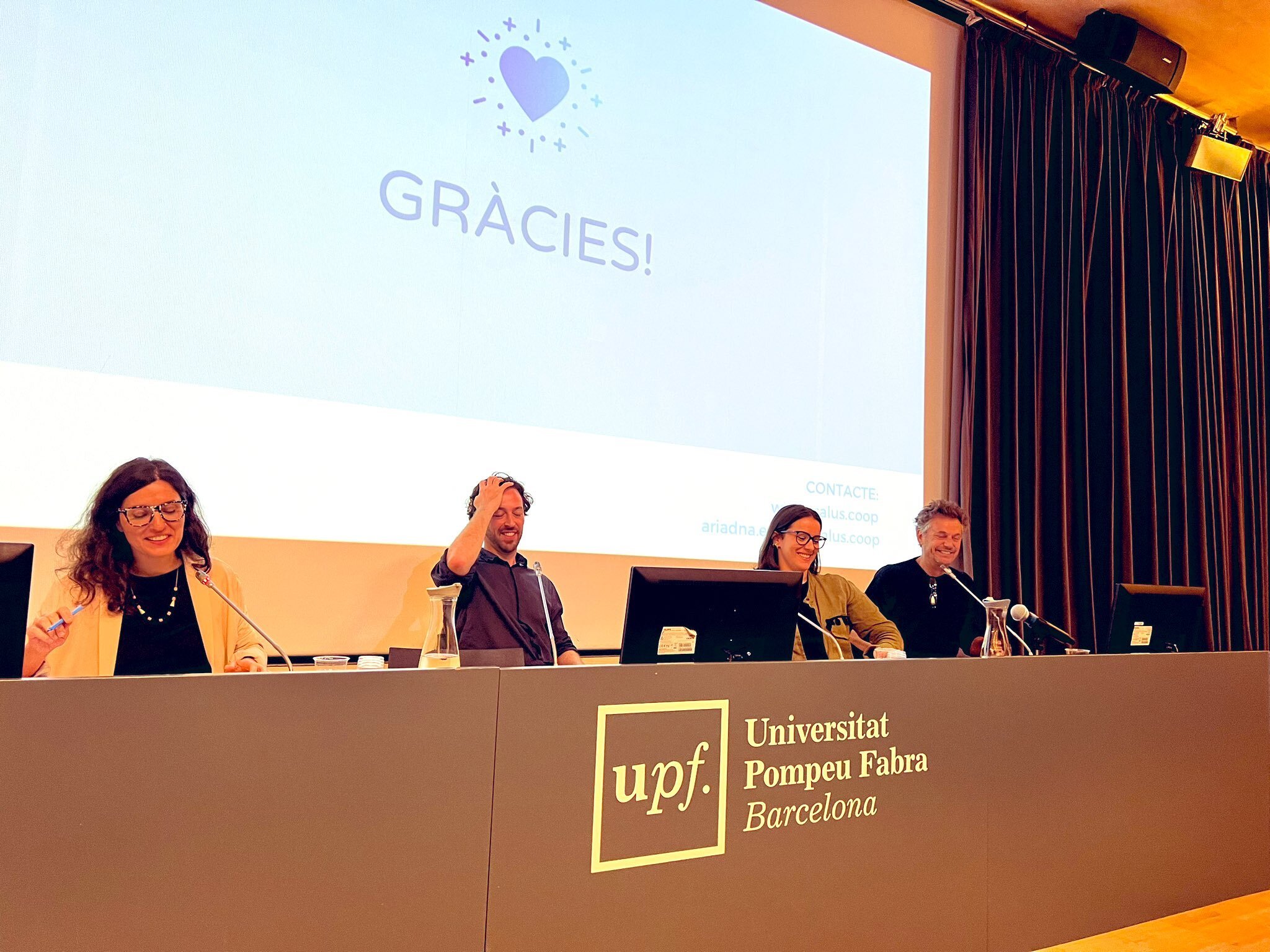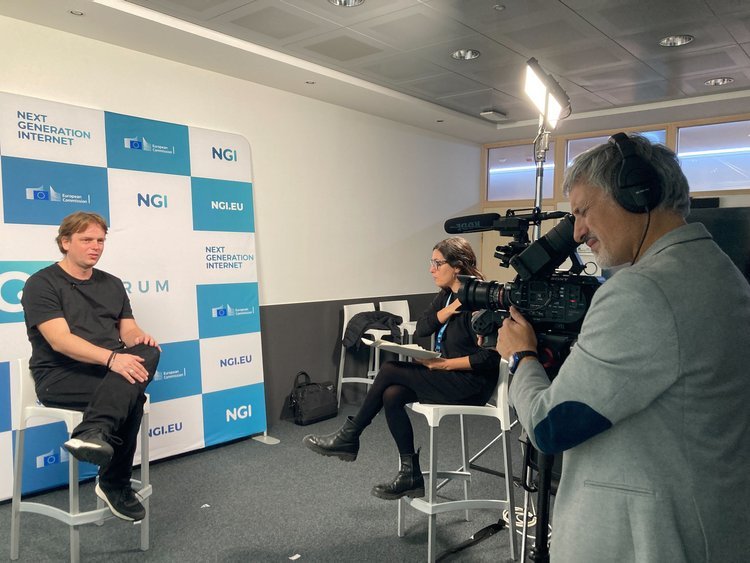Scientific research
Scientific research
DATALOG presents the citizen data visualization platform
DATALOG presents the citizen data visualization platform
2 de noviembre de 2023


By editorial team. (Originally published in Spanish)
Last week we presented alongside the Universitat Pompeu Fabra how the platform for visualising citizen data on water, electricity and gas consumption will be launched next month as part of the DATALOG project.
The governance and altruism of data is increasingly under the spotlight. A little over a month ago, the European Data Governance Act came into force, an initiative aimed at increasing trust in data sharing, strengthening mechanisms to enhance data availability, and overcoming technical obstacles to its reuse.
In this landscape of citizen data as a collective opportunity, we presented at the Auditorium of the Universitat Pompeu Fabra the data visualisation platform of DATALOG, the winning project of the Ciutat Proactiva 2022 programme promoted by Bit Habitat.
Following the welcome from Michael Donaldson, Commissioner for Urban Innovation of the Barcelona City Council, there was a panel discussion on data altruism and how to interpret it collectively to generate a common benefit, moderated by Anna Higueras, project manager at Ideas for Change. The roundtable included the participation of Albert Cañigueral, expert consultant in innovation, technology and data, Anna Sàez, head of support for the implementation of the open data governance model of the Generalitat of Catalunya, Manuel Portela, consultant and researcher in urban innovation and data, and president of DATALOG, and Javi Creus, founder of Ideas for Change.
Cañigueral contextualised the current situation around data, the digital revolution, data cooperatives, and the importance of solidifying the institutionalisation of these initiatives. For his part, Creus focused on seeing data as a collective opportunity and presented SalusCoop, a data cooperative aimed at promoting citizen empowerment through the sharing of health data. Anna Sàez highlighted the role of open data in public administration that addresses the needs of citizens with the aim of publishing purposeful data that can be reused. Finally, Portela spoke about seeking alternative pathways to promote interoperable data that contributes to urban research and innovation, emphasizing DATALOG, which will create an electricity, water, and gas consumption map of Barcelona from the data visualisation platform.
The data governance to legitimise entities that uphold these values, the social and personal benefits of these new institutions and data altruism were some of the most prominent topics of the debate table, alongside data journalism and the cultural effect.
Once this first part was completed, the star moment of the event took place: the presentation of DATALOG's data visualisation platform. Professor and researcher at the Universitat Pompeu Fabra, Vladimir Estivill, showcased the demo that will map the energy, water, and gas consumption of the city of Barcelona which will be launched next month.
Additionally, DATALOG will also have its place during the Barcelona Innova Week to be held from 14 to 20 November. On 18 November at Ca l’Alier, we will organise a participatory session to reflect on the current citizen consumption situation in the city and how we can immerse ourselves in the world of data in an easy, fun, and educational way.
Finally, it was also announced that: DATALOG is now an association! On October 20th, the first official assembly was held and the procedures for incorporating new members were determined. Furthermore, discussions were held about the definition of the protocol, the data advisory board or the ethical model, among other aspects.
By editorial team. (Originally published in Spanish)
Last week we presented alongside the Universitat Pompeu Fabra how the platform for visualising citizen data on water, electricity and gas consumption will be launched next month as part of the DATALOG project.
The governance and altruism of data is increasingly under the spotlight. A little over a month ago, the European Data Governance Act came into force, an initiative aimed at increasing trust in data sharing, strengthening mechanisms to enhance data availability, and overcoming technical obstacles to its reuse.
In this landscape of citizen data as a collective opportunity, we presented at the Auditorium of the Universitat Pompeu Fabra the data visualisation platform of DATALOG, the winning project of the Ciutat Proactiva 2022 programme promoted by Bit Habitat.
Following the welcome from Michael Donaldson, Commissioner for Urban Innovation of the Barcelona City Council, there was a panel discussion on data altruism and how to interpret it collectively to generate a common benefit, moderated by Anna Higueras, project manager at Ideas for Change. The roundtable included the participation of Albert Cañigueral, expert consultant in innovation, technology and data, Anna Sàez, head of support for the implementation of the open data governance model of the Generalitat of Catalunya, Manuel Portela, consultant and researcher in urban innovation and data, and president of DATALOG, and Javi Creus, founder of Ideas for Change.
Cañigueral contextualised the current situation around data, the digital revolution, data cooperatives, and the importance of solidifying the institutionalisation of these initiatives. For his part, Creus focused on seeing data as a collective opportunity and presented SalusCoop, a data cooperative aimed at promoting citizen empowerment through the sharing of health data. Anna Sàez highlighted the role of open data in public administration that addresses the needs of citizens with the aim of publishing purposeful data that can be reused. Finally, Portela spoke about seeking alternative pathways to promote interoperable data that contributes to urban research and innovation, emphasizing DATALOG, which will create an electricity, water, and gas consumption map of Barcelona from the data visualisation platform.
The data governance to legitimise entities that uphold these values, the social and personal benefits of these new institutions and data altruism were some of the most prominent topics of the debate table, alongside data journalism and the cultural effect.
Once this first part was completed, the star moment of the event took place: the presentation of DATALOG's data visualisation platform. Professor and researcher at the Universitat Pompeu Fabra, Vladimir Estivill, showcased the demo that will map the energy, water, and gas consumption of the city of Barcelona which will be launched next month.
Additionally, DATALOG will also have its place during the Barcelona Innova Week to be held from 14 to 20 November. On 18 November at Ca l’Alier, we will organise a participatory session to reflect on the current citizen consumption situation in the city and how we can immerse ourselves in the world of data in an easy, fun, and educational way.
Finally, it was also announced that: DATALOG is now an association! On October 20th, the first official assembly was held and the procedures for incorporating new members were determined. Furthermore, discussions were held about the definition of the protocol, the data advisory board or the ethical model, among other aspects.


